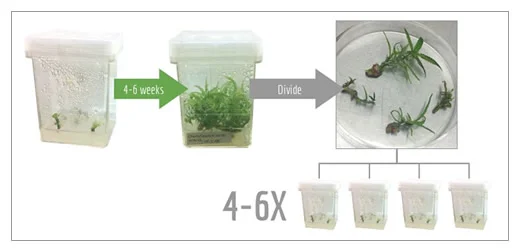our
Consulting Services
Tissue-Culture
Tissue-culture based propagation (micropropagation) can significantly increase your facility's capacity to produce vast numbers of vigorous, disease free clones using a fraction of the space, labor, and resources required by traditional cutting based cloning. At first glance, micropropagation looks complex and difficult to learn. However the principles are actually easy to grasp and the techniques are straightforward. They just take practice. Dr. Jones is a great teacher and can help you design, build, and operate a tissue culture program that meets your goals.
Every 4-6 weeks, each tiny cannabis explant can yield 4-6 new buds. By the end of one year, 4 explants could yield over 1,000,000 plants after 10 multiplication cycles.
Protocol Development
To transform a tiny fragment of a plant tissue into a healthy, productive mature plant requires a specific combination of inputs and conditions. Though the principles are the same for all plants, each species or strain may require a unique combination for success. Dr. Jones can not only optimize tissue culture protocols for your particular strains, she will also teach you the systematic optimization strategies that she uses so that you can conduct your own independent R&D.
training
The success of any micropropagation facility is dependent on consistent use of sterile technique by the workforce. We can help you develop the SOPs and the training programs necessary to ensure your people have the knowledge and skill necessary to produce consistent and reliable results.
Facility planning & ramp up
Proper facility layout is critical to ensure both sterility and efficient workflow. Dr. Jones can help you design and equip your facility to best meet production goals while still conforming to space or labor limitations.
Controlled Environment Agriculture
The cannabis industry is quickly evolving. Public acceptance and demand is rising, but so is supply and competition. Margins are shrinking and many growers are struggling to maintain profitability AND quality. Survival will require adoption of new practices to improve production efficiency and quality. Luckily, there is no need to reinvent the wheel. The fields of Controlled Environment Agriculture, Horticulture, and Floriculture (our background) have been working on production efficiency, quality, sustainability, and profitability for decades, helping growers build their businesses through smart, science-based decision making. Despite razor-thin margins, these industries thrive. Let us help you tap into this knowledge base so that you can avoid costly mistakes and build your business to last.
Nutrient FORMULATIONS
There are hundreds of proprietary, overpriced premixed nutrient solutions on the market promising better growth, health, and potency. You don’t need them. Dr. Pagliarulo can give you the tools and knowledge necessary to formulate your own fertigation regimes (just like the mega-greenhouse growers do) to maximize yields and slash fertilizer costs.
Automation
Does your facility struggle with inconsistency issues? Do you want to reduce labor, water, and, fertilizer costs? The key to crop consistency and cultivation efficiency is automation. We can help you adopt technologies like auto-fertigation and environmental control systems that optimize growing conditions while significantly reducing the need for worker input.
integrated pest management
Does your facility have issues with powdery mildew, virus, whitefly, mites, etc? Do you want to reduce or eliminate application of synthetic pesticides? Our team can help you adopt IPM practices and disease control measures to significantly reduce crop losses and keep pests under control using green sustainable practices.
From left to right: Drought stressed plant infested by while fly; tobacco mosaic virus; powdery mildew; and spider mites.



